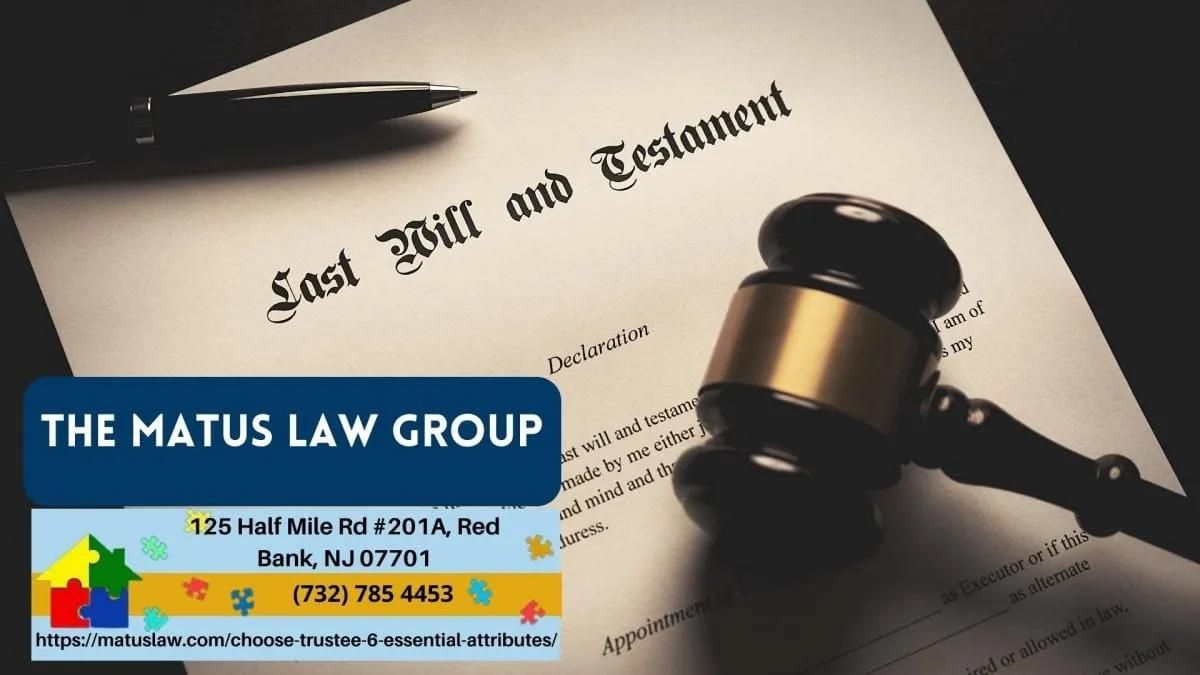Selecting the appropriate trustee is one of the most critical decisions in estate planning, and New Jersey trust attorney Christine Matus (https://matuslaw.com/choose-trustee-6-essential-attributes/) of The Matus Law Group emphasizes its significance in her latest guide, “How to Choose a Trustee: 6 Essential Attributes.” In this comprehensive overview, Matus outlines the essential qualities and considerations necessary for making an informed decision that aligns with the needs and goals of a family’s estate.
Choosing a trustee requires careful thought because this individual or entity will be responsible for managing and distributing assets according to the wishes of the trust’s creator. Christine Matus, a seasoned New Jersey trust attorney, explains that the right trustee can ensure the beneficiaries are cared for and the estate is handled efficiently and ethically. “Trustees carry the weighty responsibility of managing a trust’s assets and adhering to its terms while acting in the best interest of the beneficiaries,” says Matus.
Understanding the legal and fiduciary responsibilities of a trustee is crucial in making this decision. According to Christine Matus, a New Jersey trust attorney, trustees must be reliable, diligent, and possess a strong understanding of financial and legal obligations. These attributes are essential to ensure that the trust is administered smoothly and according to its intended purpose.
In her guide, Matus explains that trustees in New Jersey can be individuals or corporations, such as banks or trust companies. However, she cautions that choosing the right trustee is about more than just meeting basic legal criteria. “Your trustee should be someone you can trust implicitly,” advises Matus, “because they will be the ones making critical decisions about your estate, often without direct oversight from the beneficiaries.”
Christine Matus outlines six essential attributes that should be considered when selecting a trustee. These include integrity and good judgment, the ability to handle responsibility, business savvy, attention to detail, and strong communication skills. Each of these qualities plays a vital role in the effective administration of a trust.
Integrity is paramount, as the trustee will need to balance the competing interests of various beneficiaries while ensuring the trust’s longevity. Matus stresses that the trustee must have the good judgment to make decisions that align with the grantor’s wishes and the trust’s purpose. “The integrity of the trustee is vital,” says Matus, “because they will often be operating independently, without the beneficiaries’ ability to oversee every action.”
Another critical factor is the trustee’s ability to take on long-term responsibility. Trusts can last for many years, and being a trustee is a long-term commitment that can require significant time and effort. Matus advises clients to choose someone who is not only willing but also able to fulfill these duties for the duration of the trust. If the trustee is likely to predecease the beneficiaries, Matus recommends appointing a successor trustee to ensure continuity.
Business acumen is also essential, particularly for trusts involving complex financial or investment management. Matus points out that while trustees do not need to be financial experts, they should have enough knowledge or savvy to engage competent professionals when necessary. This is particularly important for trusts that include business interests or other complex assets.
Attention to detail is another crucial quality, as trustees must carefully follow the instructions laid out in the trust document. The trust’s success depends on the trustee’s ability to execute the grantor’s wishes precisely. “Trustees must be detail-oriented and able to follow instructions meticulously,” Matus notes, “to ensure that every aspect of the trust is managed according to the grantor’s intentions.”
Finally, good communication skills are necessary for a trustee to interact effectively with beneficiaries. Matus highlights the importance of the trustee being able to provide clear updates and respond to inquiries from beneficiaries. She suggests that a trustee who has a good relationship with the beneficiaries can be particularly beneficial in ensuring smooth trust administration.
The duties of a trustee are multifaceted and demanding. They include notifying beneficiaries of the grantor’s passing, managing and appraising trust assets, filing necessary tax returns, and distributing assets according to the trust terms. In cases where conflicts arise among beneficiaries, the trustee must also be capable of mediating disputes and ensuring that the trust is administered fairly and according to its purpose.
For those in New Jersey facing the complex task of choosing a trustee, Christine Matus and The Matus Law Group can offer personalized guidance to help navigate these decisions. Matus encourages individuals to consider all aspects of their estate planning needs carefully and to consult with a professional to help ensure their legacy is protected.
About The Matus Law Group:
The Matus Law Group is a dedicated law firm in New Jersey, well-versed in estate planning, trust administration, and elder law. Led by experienced New Jersey trust attorney Christine Matus, the firm is committed to providing personalized legal services that help clients protect their assets and secure their families’ futures.
Embeds:
Youtube Video: https://www.youtube.com/watch?v=x5OEkezVeqw
GMB: https://www.google.com/maps?cid=3241702663730814860
Email and website
Email: admin@matuslaw.com
Website: https://matuslaw.com/monmouth-county-nj/
Media Contact
Company Name: The Matus Law Group
Contact Person: Christine Matus
Email: Send Email
Phone: (732) 785-4453
Address:125 Half Mile Rd #201A
City: Red Bank
State: New Jersey 07701
Country: United States
Website: https://matuslaw.com/

